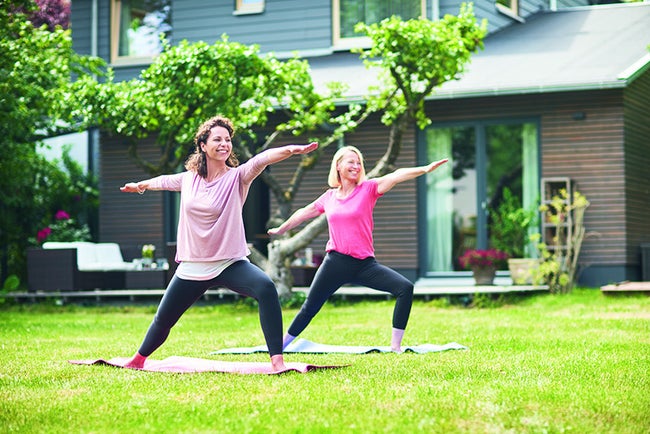Move more!
You move much more than just your body when you exercise. Cancer patients as well as healthy people can benefit in many ways from the positive effects of physical activity.
Being active can improve your inner balance. You can run away from stress, leap over low points, clear motivational hurdles and increase your stamina for the difficult phases of life.
As the adage goes:
"Move your body and your mind will follow."
Use this potential, even if it’s just small steps. On your mark. Get set. Go!
Be active for physical and mental health
Physical activity contributes to health and well-being in every phase of life and situation. This can have many positive effects like:
- strengthening muscles and bones
- reducing the risk of depression and anxiety
- improving cognitive function
- improving metabolism
- making you happier
- increasing self-confidence.
Studies show that exercising helps reduce the negative side effects of anticancer treatment (e.g., fatigue, anxiety), the risk of recurrence and improve cardiovascular fitness, muscle strength, and body composition.
Your awareness of your own body will be changing. So, you might also make changes in your health status quicker to ensure an early start to treatment in case of a relapse.
The combination of strength, endurance and coordination training in particular is known to be very beneficial for cancer patients.
Coordination training
Coordination training is beneficial for maintaining balance and to make physical movements easier overall. Even small adjustments in your everyday life can be useful.
Endurance training
Endurance training helps maintain or improve stamina and overall physical fitness.
Mind-body exercises
Mind-body exercises can combine mental focus and body movement to improve flexibility, strength and balance.
Strength training
Strength training or resistance training can be done at home or at the gym. It mainly serves muscle development and counteracts sarcopenia.
So, bare your teeth at your inner couch potato
Bare your teeth? That’s easy to say. Pain, side effects of treatment and fatigue often make it hard for patients to be active. The good news is that it doesn’t take much movement at all to improve your energy balance.
Go with what’s fun and what suits your current needs. Try to increase your physical activity in everyday life. Why not go grocery shopping by bike or take the staircase instead of the elevator? Every bit helps.
Cycling? Team sports? If you have trouble with balance or your vision, Pilates or light calisthenics while sitting or lying down are good. Endurance sports have been shown to help fight fatigue. Make sure to ask your doctor what kinds of exercise are possible for you.
Even if you aren’t as mobile anymore due to amputation, loss of muscle mass or scar pain, doctors see positive effects. Moving- baring your teeth- is worth it. Perform regular activities every day to improve your metabolism, nutrient utilization and mood.
Note: On days when...
... you're suffering badly from side effects like nausea, strong pain, confusion or circulatory problems or
... you're given cardiotoxic or nephrotoxic chemotherapeutics or
... you have fever, an infection, or acute bleeding or bleeding tendencies
You should avoid exercising.
Consult with your physician.
Avoid inactivity: Exercise is like medicine in cancer treatment
You used to love sports before your diagnosis but you don’t know if it’s still beneficial? Oncologists agree that exercise is like medicine during cancer treatment, so keep moving as much as possible.
Choose exercises you enjoy and that are suitable to your current needs.
These differ depending on your type of cancer as well as on the stage of cancer, so make sure to consult your medical team beforehand.
Please note that your personal amount and level of fitness also varies depending on your treatment and condition.
Listen to your body to decide whether you’re too exhausted and should better relax or you’re only slightly or moderately fatigued and able to do some exercises. Always remember: Doing anything is better than doing nothing. Start with small steps and consistently adjust your program.
Feel better together
Training together is much more fun. Find a training partner at your fitness level. Try to work out together to increase your motivation.
The social support of a group comes in handy for maintaining training. There are lots of fitness groups in every city. Ask your medical team or health insurance company for support. They can also decide if a professionally supervised program is required or if home-based training might work for you as well.
